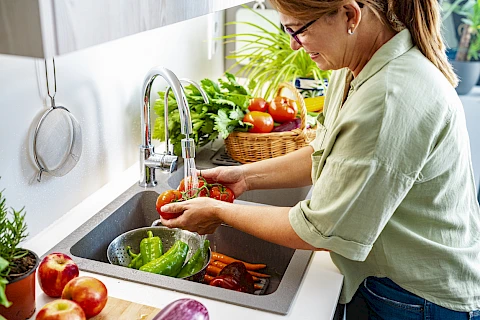
Our bodies become more susceptible to illnesses and infections as we age, which makes hygiene increasingly crucial for seniors. Caregivers are essential to ensuring food safety for seniors. Senior Helpers offer tips on safe stockpiling, preparation, and reheating to provide health protection.
Safe Storage Practices
Secure ingredient storage is crucial for seniors to prevent foodborne illnesses. By adhering to these recommendations, you can guarantee food safety for seniors, ensuring their meals remain enjoyable.
- Maintain proper refrigerator and freezer temperatures by setting your refrigerator to 40°F (4°C) or below and your freezer to 0°F (-18°C) or lower.
- Store perishable items promptly by refrigerating meat, dairy, and certain fruits and vegetables immediately after purchase.
- Avoid overcrowding the refrigerator to allow proper air circulation and maintain optimal temperatures.
- Label and date for ingredients using a permanent marker to track freshness for timely consumption.
Safe Preparation Practices
Proper cuisine prep is essential for preventing foodborne illnesses. By following these simple steps, you can ensure your meals are safe to consume.
- Maintain hand hygiene by washing your hands with soap and water for at least 20 seconds before handling food.
- Sanitize surfaces and utensils by washing them with hot, soapy water to prevent cross-contamination.
- Use separate cutting boards to avoid cross-contamination between raw meats and vegetables.
- Cleaning surfaces and utensils after handling raw meat minimizes the risk of spreading harmful bacteria.
Safe Reheating Practices
Proper reheating is essential for ensuring that leftovers are safe to consume. By following these guidelines, you can prevent gastrointestinal diseases.
- Reheat leftovers to ensure food reaches an internal temperature of 165°F (74°C) to kill harmful bacteria.
- Use appropriate methods such as microwave, stovetop, or conventional oven for reheating and avoid slow cookers.
- Use a food thermometer to ensure accurate temperature readings by inserting it into the thickest part of the meat.
High-Risk Foods for Seniors
Food safety for seniors is crucial due to their potentially weakened immune systems. Certain items carry higher risks and should be avoided to maintain their health. Here are some of them to take note of and avoid:
- Avoid raw or undercooked seafood and opt for thoroughly cooked options to reduce the risk of foodborne illnesses.
- Choose pasteurized dairy products instead of unpasteurized ones.
- Handle deli meats with care by storing them correctly and consuming them within a few days.
- Avoid raw eggs and products made from them by choosing safer alternatives like well-cooked eggs or roasted vegetables.
Senior Helpers St. Petersburg Can Help With Meal Planning and Prep
Ensuring food safety for seniors requires meticulous attention to storage, preparation, and reheating methods. By adhering to sanitation guidelines and making thoughtful daily decisions, caregivers can minimize the risk of digestive issues in their elderly loved ones. For additional support or questions about professional caregiving services in St. Petersburg, Gulfport, South Pasadena, St. Pete Beach, and Treasure Island, don't hesitate to reach out to Senior Helpers St. Petersburg.